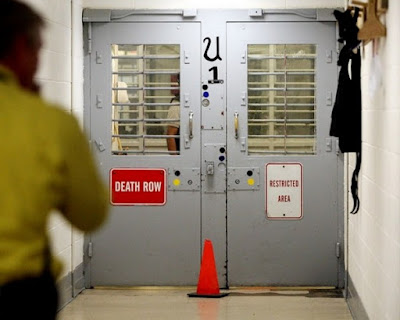 |
| South Carolina Death Row |
RIDGEVILLE — Heavily fenced in and guarded on the outskirts of Ridgeville lies Lieber Correctional Institution. Among the criminal offenders housed within are 40 inmates even more isolated than the rest.
A monotonous existence awaits those condemned to the corridors of death row. Having committed the most egregious of crimes against others across the state, these men now spend the bulk of their time alone.
They eat and sleep in single cells. The lucky ones get an hour of recreation time a day, often spent exercising or reaching through the bars that divide them to play a game of checkers with a neighboring inmate.
“You rarely hear any of them talking about the death penalty or what they have coming up,” said the prison’s warden, Joseph McFadden. Those conversations are reserved for private talks with psychologists and clergymen who come to visit from time to time, he said.
Forty-three state-ordered killings over the past four decades have earned South Carolina a ranking of seventh, per capita, among the 36 states that used the death penalty in that time, Death Penalty Information Center records show.
Punishment does not come swiftly. Lengthy judicial hearings in the appellate process can take years, sometimes decades, to navigate. And it is costly — an estimated average of $1.1 million more than pursuing life without parole.
The death-row inmates currently housed at Lieber have been in the Department of Corrections system an average of about 14 years, state records show. Meanwhile, the families they’ve victimized are left chasing closure, forced to relive their horrors with each new court date.
It’s the world that could await Dylann Roof if he’s convicted and sentenced to death in the killing of nine parishioners while they worshipped in June at Emanuel AME Church in Charleston.
Ninth Circuit Solicitor Scarlett Wilson last month announced her intentions to seek the death penalty in the case, described by some as the deadliest hate crime in South Carolina’s history.
South Carolina’s execution chamber at Broad River Correctional Institution in Columbia — a gurney, backed by a brick wall and flanked by curtains with a glass window separating it from witness seating — has sat unused since 2011.
The state’s supply of a drug cocktail used for lethal injection expired in 2013. In the meantime, South Carolina has no means of executing death-row inmates unless they agree to the state’s other allowed method: electrocution.
Only three of the 39 death-row inmates put to death in South Carolina have opted for electrocution since lethal injection was brought into practice in 1995, Corrections Department records show.
“We continue to look for alternatives and acquire the drugs used in our procedure,” Corrections spokeswoman Stephanie Givens said of the state’s status to address the situation.
Until the issue is resolved, those condemned to death row remain at Lieber, biding their time under [Warden] McFadden’s watchful eye as the clock winds down.
Source: The Post and Courier, Christina Elmore, October 17, 2015










